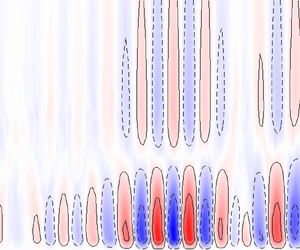Crossref Citations
This article has been cited by the following publications. This list is generated based on data provided by
Crossref.
Abreu, Leandra I.
Cavalieri, André V.G.
Schlatter, Philipp
Vinuesa, Ricardo
and
Henningson, Dan S.
2020.
Resolvent modelling of near-wall coherent structures in turbulent channel flow.
International Journal of Heat and Fluid Flow,
Vol. 85,
Issue. ,
p.
108662.
Wu, Ting
and
He, Guowei
2021.
Space-time energy spectra in turbulent shear flows.
Physical Review Fluids,
Vol. 6,
Issue. 10,
Kaiser, Thomas Ludwig
and
Oberleithner, Kilian
2021.
A global linearized framework for modelling shear dispersion and turbulent diffusion of passive scalar fluctuations.
Journal of Fluid Mechanics,
Vol. 915,
Issue. ,
Gupta, Vikrant
Madhusudanan, Anagha
Wan, Minping
Illingworth, Simon J.
and
Juniper, Matthew P.
2021.
Linear-model-based estimation in wall turbulence: improved stochastic forcing and eddy viscosity terms.
Journal of Fluid Mechanics,
Vol. 925,
Issue. ,
Tissot, Gilles
Cavalieri, André V. G.
and
Mémin, Étienne
2021.
Stochastic linear modes in a turbulent channel flow.
Journal of Fluid Mechanics,
Vol. 912,
Issue. ,
Martini, Eduardo
Rodríguez, Daniel
Towne, Aaron
and
Cavalieri, André V.G.
2021.
Efficient computation of global resolvent modes.
Journal of Fluid Mechanics,
Vol. 919,
Issue. ,
Amaral, Filipe R.
Cavalieri, André V.G.
Martini, Eduardo
Jordan, Peter
and
Towne, Aaron
2021.
Resolvent-based estimation of turbulent channel flow using wall measurements.
Journal of Fluid Mechanics,
Vol. 927,
Issue. ,
Kleine, Vitor G.
Sasaki, Kenzo
Cavalieri, André V. G.
Brès, Guillaume A.
and
Colonius, Tim
2021.
Real-time supersonic jet noise predictions from near-field sensors with a wavepacket model.
The Journal of the Acoustical Society of America,
Vol. 150,
Issue. 6,
p.
4297.
Pickering, Ethan
Rigas, Georgios
Schmidt, Oliver T.
Sipp, Denis
and
Colonius, Tim
2021.
Optimal eddy viscosity for resolvent-based models of coherent structures in turbulent jets.
Journal of Fluid Mechanics,
Vol. 917,
Issue. ,
Chen, Zhibo
and
Towne, Aaron
2021.
An azimuthal Fourier domain formulation of the Ffowcs Williams and Hawkings equation.
The Journal of the Acoustical Society of America,
Vol. 150,
Issue. 3,
p.
1967.
Nogueira, Petrônio A. S.
Morra, Pierluigi
Martini, Eduardo
Cavalieri, André V. G.
and
Henningson, Dan S.
2021.
Forcing statistics in resolvent analysis: application in minimal turbulent Couette flow.
Journal of Fluid Mechanics,
Vol. 908,
Issue. ,
Cavalieri, André V. G.
and
da Silva, André F. C.
2021.
Cross proper orthogonal decomposition.
Physical Review Fluids,
Vol. 6,
Issue. 1,
Karban, U.
Martini, E.
Cavalieri, A.V.G.
Lesshafft, L.
and
Jordan, P.
2022.
Self-similar mechanisms in wall turbulence studied using resolvent analysis.
Journal of Fluid Mechanics,
Vol. 939,
Issue. ,
Jin, Bo
Illingworth, Simon J.
and
Sandberg, Richard D.
2022.
Resolvent-based approach for $$\pmb {H_2}$$-optimal estimation and control: an application to the cylinder flow.
Theoretical and Computational Fluid Dynamics,
Vol. 36,
Issue. 3,
p.
491.
Martini, Eduardo
Jung, Junoh
Cavalieri, André V.G.
Jordan, Peter
and
Towne, Aaron
2022.
Resolvent-based tools for optimal estimation and control via the Wiener–Hopf formalism.
Journal of Fluid Mechanics,
Vol. 937,
Issue. ,
Karban, Ugur
Martini, Eduardo
Jordan, Peter
Brès, Guillaume A.
and
Towne, Aaron
2022.
Solutions to aliasing in time-resolved flow data.
Theoretical and Computational Fluid Dynamics,
Vol. 36,
Issue. 6,
p.
887.
Jung, Junoh
Bhagwat, Rutvij
and
Towne, Aaron
2023.
Resolvent-based estimation of flow around an airfoil for closed-loop control.
Ballouz, Eric
Lopez-Doriga, Barbara
Dawson, Scott T.
and
Bae, Hyunji Jane
2023.
Wavelet-based resolvent analysis for statistically-stationary and temporally-evolving flows.
Herrmann, Benjamin
Baddoo, Peter J.
Dawson, Scott T.M.
Semaan, Richard
Brunton, Steven L.
and
McKeon, Beverley J.
2023.
Interpolatory input and output projections for flow control.
Journal of Fluid Mechanics,
Vol. 971,
Issue. ,
Towne, Aaron
Dawson, Scott T. M.
Brès, Guillaume A.
Lozano-Durán, Adrián
Saxton-Fox, Theresa
Parthasarathy, Aadhy
Jones, Anya R.
Biler, Hulya
Yeh, Chi-An
Patel, Het D.
and
Taira, Kunihiko
2023.
A Database for Reduced-Complexity Modeling of Fluid Flows.
AIAA Journal,
Vol. 61,
Issue. 7,
p.
2867.
